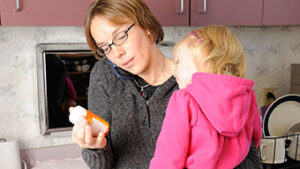Why do babysitters or child care providers need to know about poison?
Poisoning is one of the most common childhood injuries. Most of the time, poisonings happen at home. Children from 8 months to 6 years old are the most likely to be poisoned.
Poisons can look like things that are good to eat and drink. They can come in many colors and forms, including solids, liquids, sprays or gases. Young children are curious. They like to put things in their mouths, especially things that look colorful or smell nice. It’s a good idea to have emergency information handy when you’re babysitting. Make sure you have the parents’ contact information. Make sure you have the number for the Kentucky Poison Control Center: (800) 222-1222.
What are some common poisons?
These poisonous products may be found in and around the home:
- Alcohol
- Batteries
- Bug and weed killers
- Cigarettes
- Cleaning products
- Eye drops
- Laundry products
- Lighter fluid
- Makeup and other cosmetics
- Medicines
- Mouthwash
- Nail polish products
- Plants (indoor and outdoor)
- Vitamins and iron pills
How can children be kept safe from poisons?
Follow these safety tips:
- Know where the children are and what they are doing at all times, especially if you have to step away for a moment, such as to answer the door.
- Expect children to be curious, understand the child’s abilities according to age and developmental skill.
- Make sure possible poisons are not left on counters in the kitchen, laundry room and bathrooms.
- Do not leave your purse or handbag where a child can reach it. Store it in a safe place. Cosmetics, perfumes, medications and vitamins are common handbag contents that could poison a child. If you use a poisonous product, put it away immediately.
- If you are asked to give medicine to a child, follow the instructions exactly as the parents instructed. After using the medicine, make sure the cap is on tight and return the container to a safe storage place right away. Never leave a child alone with the medicine.
- Never call medicine “candy” in order to get a child to take it.
- If you think there might be a problem, call the poison control center immediately. We’re here to help and answer your questions.
- Before parents leave you in charge of a child, make sure they write down some basic information, such as:
- Each child’s age and weight
- Any allergies or medical conditions
- Children’s doctor’s name and telephone number
- How the parents can be reached in an emergency
Get help
If you think a child in your care has been poisoned, don’t panic! Most poisonings can be taken care of at home with the help of the poison control center experts. Call (800) 222-1222 right away. Do not wait for the child to look or feel sick. We are here to answer questions, too, not just for emergencies.
If you call us, a poison specialist will ask you for this information:
- Your name and phone number
- The name of the child
- Your relationship to the child
- Age and weight of the child
- Name of the product and how the child came in contact with it
- Time of poisoning
- How the child looks and feels at the time of the call
Make sure you know the poison control center’s telephone number: (800) 222-1222. Keep a card or sticker with the poison control center’s telephone number, carry it with you on your babysitting jobs and save the number in your cellphone.
For more poison prevention and first aid information, call (800) 222-1222.


